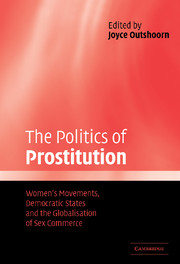 The Politics of Prostitution
The Politics of Prostitution Book contents
- Frontmatter
- Contents
- List of figures
- List of tables
- Notes on contributors
- Preface
- 1 Introduction: prostitution, women's movements and democratic politics
- 2 The women's movement and prostitution politics in Australia
- 3 Taxes, rights and regimentation: discourses on prostitution in Austria
- 4 Prostitution policies in Britain, 1982–2002
- 5 Prostitution as public nuisance: prostitution policy in Canada
- 6 Towards a new prohibitionism? State feminism, women's movements and prostitution policies in Finland
- 7 Prostitute movements face elite apathy and gender-biased universalism in France
- 8 The politics of prostitution and trafficking of women in Israel
- 9 Italy: the never-ending debate
- 10 Voluntary and forced prostitution: the ‘realistic approach’ of the Netherlands
- 11 State feminism and central state debates on prostitution in post-authoritarian Spain
- 12 Criminalising the john – a Swedish gender model?
- 13 The invisible issue: prostitution and trafficking of women and girls in the United States
- 14 Comparative prostitution politics and the case for state feminism
- Appendix 1 Independent variable indicators
- Appendix 2 Worksheets
- References
- Index
2 - The women's movement and prostitution politics in Australia
Published online by Cambridge University Press: 22 September 2009
- Frontmatter
- Contents
- List of figures
- List of tables
- Notes on contributors
- Preface
- 1 Introduction: prostitution, women's movements and democratic politics
- 2 The women's movement and prostitution politics in Australia
- 3 Taxes, rights and regimentation: discourses on prostitution in Austria
- 4 Prostitution policies in Britain, 1982–2002
- 5 Prostitution as public nuisance: prostitution policy in Canada
- 6 Towards a new prohibitionism? State feminism, women's movements and prostitution policies in Finland
- 7 Prostitute movements face elite apathy and gender-biased universalism in France
- 8 The politics of prostitution and trafficking of women in Israel
- 9 Italy: the never-ending debate
- 10 Voluntary and forced prostitution: the ‘realistic approach’ of the Netherlands
- 11 State feminism and central state debates on prostitution in post-authoritarian Spain
- 12 Criminalising the john – a Swedish gender model?
- 13 The invisible issue: prostitution and trafficking of women and girls in the United States
- 14 Comparative prostitution politics and the case for state feminism
- Appendix 1 Independent variable indicators
- Appendix 2 Worksheets
- References
- Index
Summary
Introduction
Prostitution has been legalised in several Australian states and territories during the past twenty-five years. Street walking or public soliciting for the purposes of prostitution is legal in New South Wales (NSW). Brothels and/or escort agencies may operate openly in Victoria, NSW, Queensland, the Northern Territory and the Australian Capital Territory (ACT). In most cases, brothel premises and the owners and operators of brothels (not workers) are subject to licensing and sex workers employed in legal prostitution businesses have many of the same rights as other Australian workers (Sullivan 1997).
This trend towards the legalisation of prostitution in Australia makes it similar to the Netherlands but puts it at clear odds with countries such as Britain, Canada, the USA and France. Like other former British colonies, Australia's legal system was inherited from Britain. Thus, while the act of prostitution has never been illegal, until recently most prostitution-related activities – for example, keeping a brothel, soliciting for the purposes of prostitution and living on the earnings of prostitution – attracted criminal penalties. This is still the situation in the three ‘unreformed’ states of Western Australia, South Australia and Tasmania. However, in other Australian jurisdictions, the ‘British’ model of prostitution law started to change in the late 1970s and 1980s.
- Type
- Chapter
- Information
- The Politics of ProstitutionWomen's Movements, Democratic States and the Globalisation of Sex Commerce, pp. 21 - 40Publisher: Cambridge University PressPrint publication year: 2004
- 2
- Cited by


